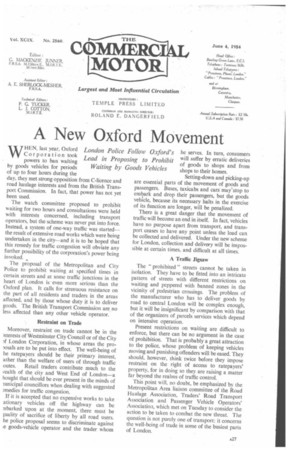A New Oxford Movement
Page 29

If you've noticed an error in this article please click here to report it so we can fix it.
WHEN, last year, Oxford Corporation took powers to ban wafting by goods vehicles for periods of up to four hours during the day, they met strong opposition from C-licence and road haulage interests and from the British Transport Commission. In fact, that power has not yet been used.
The watch committee proposed to prohibit waiting for two hours and consultations were held with interests concerned, including transport operators, but the scheme was never put into force. instead, a system of one-way traffic was started— the result of extensive road works which were being undertaken in the city—and it is to be hoped that this remedy for traffic congestion will obviate any further possibility of the corporation's power being invoked.
The proposal of the Metropolitan and City Police to prohibit waiting at specified times in certain streets and at some traffic junctions in the heart of London is. even more serious than the Oxford plan. It calls for strenuous resistance on the part of all residents and traders in the areas affected, and by those whose duty it is to deliver goods. The British Transport Commission are no less affected than any other vehicle operator.
Restraint an Trade Moreover, restraint on trade cannot be in the nterests of Westminster City Council or of the City A London Corporation, in whose areas the pro3osals are to be put into effect. The well-being of he ratepayers should be their primary interest. ather than the welfare of users of through traffic outes. Retail traders contribute much to the vealth of the city and West End of London—a hought that should be ever present in the minds of tunicipal councillors when dealing with suggested medies for traffic congestion.
If it is accepted that no expensive works to take ationary vehicles off the highway can be libarked upon at the moment, there must be ivality of sacrifice of liberty by all road users. he police proposal seems to discriminate against ie goods-vehicle operator and the trader whom he serves. In turn, consumers will suffer by erratic deliveries of goods to shops and from shops to their homes.
Setting-down and picking-up are essential parts of the movement of goods and passengers. Buses, taxicabs and cars may stop to embark and drop their passengers, but the goods vehicle, because its necessary halts in the exercise of its function are longer, will be penalized.
There is a great danger that the movement of traffic will become an end in itself. In fact, vehicles have no purpose apart from transport, and transport ceases to have any point unless the load can be collected and delivered. Under the new scheme for London, collection and delivery will be impossible at certain times, and difficult at all times.
A Traffic Jigsaw The " prohibited " streets cannot be taken in isolation. They have to be fitted into an intricate pattern of streets with different restrictions on waiting and peppered with banned zones in the vicinity of pedestrian crossings. The problem of the manufacturer who has to deliver goods by road to central London will be complex enough, but it will be insignificant by comparison with that of the organizers of parcels services which depend on intensive operation.
Present restrictions on waiting are difficult to enforce, but there can be no argument in the case of prohibition. That is probably a great attraction to the police, whose problem of keeping vehicles moving and punishing offenders will be eased. They should, however, think twice before they impose restraint on the right of access to ratepayers' property, for in doing so they are raising a matter far beyond the realms of traffic control.
This point will, no doubt, be emphasized by the Metropolitan Area liaison committee of the Road Haulage Association, Traders' Road Transport Association and Passenger Vehicle Operators' Associatioa, which met on Tuesday to consider the action to be taken to combat the new threat. The question is not purely one of transport: it concerns the well-being of trade in some of the busiest parts of London.












































































































